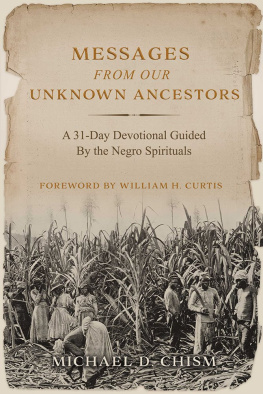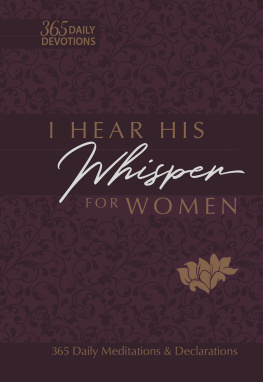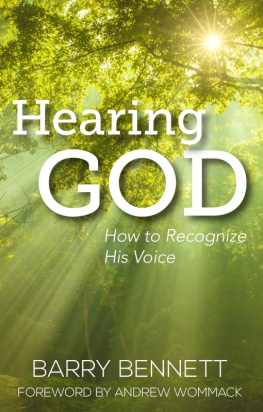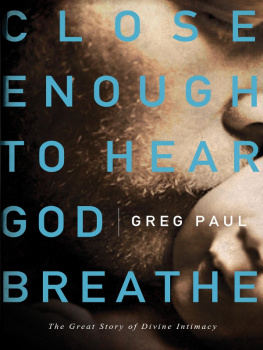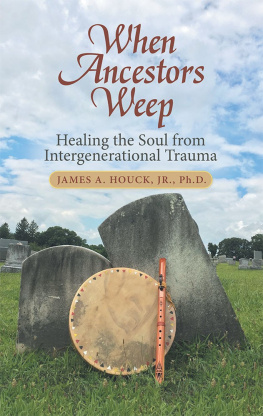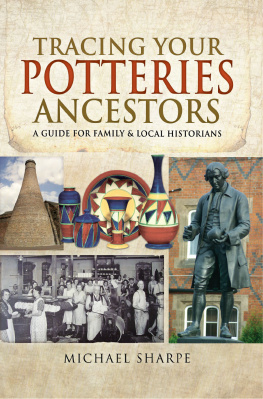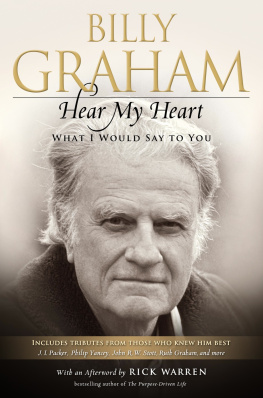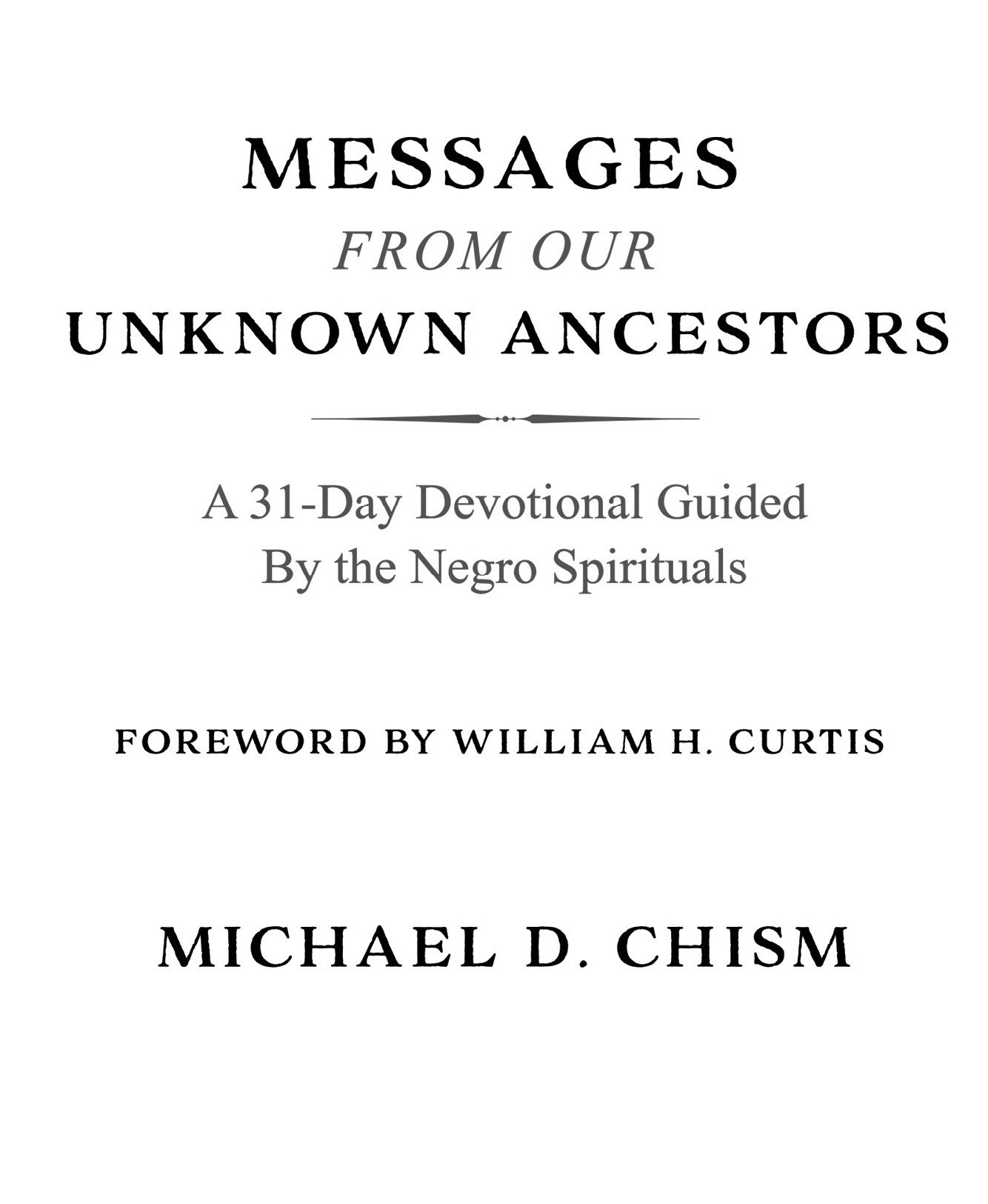Copyright 2019 by Michael D. Chism
All rights reserved. This book or any portion thereof may not be reproduced or used in any manner whatsoever without the express written permission of the publisher except for the use of brief quotations in a book review.
Print ISBN: 978-1-54396-615-2
eBook ISBN: 978-1-54396-616-9
Foreword
I had the wonderful fortune of meeting Dr. Michael D. Chism when he enrolled as a Doctoral student at the United Theological Seminary in Dayton Ohio. I have been thankful to God for the privilege of being his Doctoral mentor every since. I discerned his deep devotional mind; His love for God; along with his deep and profound appreciation for the music of our African heritage. Theologian Soren Kierkegaard said, Life can only be understood backwards, but it must be lived forward.
Dr. Chism, connects the history of African heritage conveyed in music and the forward spiritual journey we are all blessed to live. These devotions are deeply theological, scripturally accurate and very intimate in expression.
My morning devotions will be greatly enhanced with this resource and I pray it has wide reading and deep seeding for lives attempting to offer God faithful stewardship of mind, body and spirit.
Blessings,
Dr. William H. Curtis, Senior Pastor
Mount Ararat Baptist Church
Pgh. Pa
Introduction
I am my ancestors wildest dreams. I believe my ancestors dreamt of a time when they would be free. I believe they dreamt of a time where they would be free to read and write and not be punished. It is my belief that they wanted to their voices to be heard. The Negro Spiritual was a vehicle that was used to bring the African American community to where it is today, telling of uprooted peoples pain, sorrow, suffering but also providing hope to the singers and their listeners. Historically, they were sung in the fields among slaves and sharecroppers, in peoples homes, and in churches. But in todays society, spirituals are seldom sung or even heard in churches due to the rise of hymns and mainstream gospel music. This devotional was written for several reasons. The first reason is that I believe we can still hear our ancestors voices speaking through the music we listen to today. We can hear the call and response pattern, the syncopated rhythm, and other patterns which were birthed from the Negro Spirituals. The next reason is that although we are not times of slavery, we all go through tough, tumultuous times in our lives. We have worked from sun up to sundown. We have experienced our families being ripped apart at the seams. Weve had to adapt to different cultures over time. We have felt like our deliverance is going to come. We have suffered at the expense of someone else and yet through it all, we have survived with the help of the Lord. The final reason for this devotional is that we can have hope. We can have hope trouble wont last always. We can know that nobody knows the trouble weve seen, nobody knows but Jesus. We can believe that soon we will be done with the troubles of this world because we will go home to be with God. The Negro Spirituals show us that we can look to God in our suffering. We can look to God in our oppression. We can look to God in our pain. Our conditions dont have to cause us to forget about God, but keep our eyes toward heaven. Our ancestors are still speaking and all we have to do is listen!
Soon Ah Will Be Done
Day One

Devotion
There was a time I was laying in my room. I had just been punished because of my behavior in school. I laid there thinking, There has to be more to life than this! No one should be treated this way! One weekend, I attended a concert at one of the local African Methodist Episcopal Churches (I dont remember which one) and one of the songs in the concert was entitled, Soon-A will Be Done. This song resonated in my spirit for several reasons. One reason is that it transported me to the mindset of our ancestors working from sun up to sundown for no pay, while being beaten for no reason at all. Cotton was being collected; the masters children were being cared for while their children were forced to work alongside them. The conditions were less than unfavorable, yet they had hope. Hope that one day things would change. Hope that one day things would be different. Hope that slavery would no longer be a part of their lives and one day they would be free. This is a time the slaves longed for!
This particular spiritual, like many others, is not ascribed to a specific author, although it was composed by William Dawson. This spiritual pointed toward a time where our ancestor would not have to deal with the troubles of the world. Our ancestors wanted to meet their mothers, possibly suggesting they never knew their mothers. But they knew they wanted to see Jesus, as referenced in the spiritual. Our ancestors knew their present reality wasnt their final destination and they looked forward to the time they would be able to go home to be with God. Our ancestors had hope despite the troubles they faced in the world.
We, just like our ancestors, do not have to mentally succumb to the troubles of this world. We, like our ancestors, can have hope despite the troubles we face.
Words from our ancestors
Soon-A will be done with the trouble of this world. Soon-A will be done with the trouble of this world. Going home to live with God.
Scripture: 2 Corinthians 4:18(New International Version)
There is a Balm in Gilead
Day Two

Devotion
Our ancestors, according to Howard Thurman in his work Deep River: The Negro Spiritual Speaks of Life and Death, answered a question based on what they learned from the Holy Bible. Jeremiah 8:22 asked the question, Is there no balm in Gilead? Thurman says, The basic insight here is one of optimism---an optimism that grows out of the pessimism of life and transcends it. It is an optimism that uses the pessimism of life as raw material out of which it creates its own strength. Our ancestor recognized there was an answer to this question. Thurman says, The slave caught the mood of this spiritual dilemma, and with it an amazing thing. He straightened the question mark in Jeremiahs sentence into an exclamation point with an exclamation point: There is a Balm in Gilead!
Jeremiah knew the answer to his question as well, but the plight of the Israelites caused him to ask the question. We all deal with situations which cause us to ask questions, even if we know the answer. Our ancestors, in the dark moments of their lives knew there was a balm in Gilead. Our ancestors knew they had two answers to choose from in answering this age old question. Our ancestor could have been pessimistic in their approach and believed there was no Balm in Gilead, but decided to be optimistic and said there was a Balm in Gilead.
In our lives, we have to choose to either be pessimistic or optimistic. We can either see the glass half full or see the glass half empty. How we view the situations in our lives will determine how we handle our situations. If we see the glass half empty, we dont have hope that things will change. If we see the glass half full, we look forward to the day when things will change and do what we can until that day comes. An optimistic view about our situations gives us hope and gives us the push we need to deal with whatever life throws at us.

